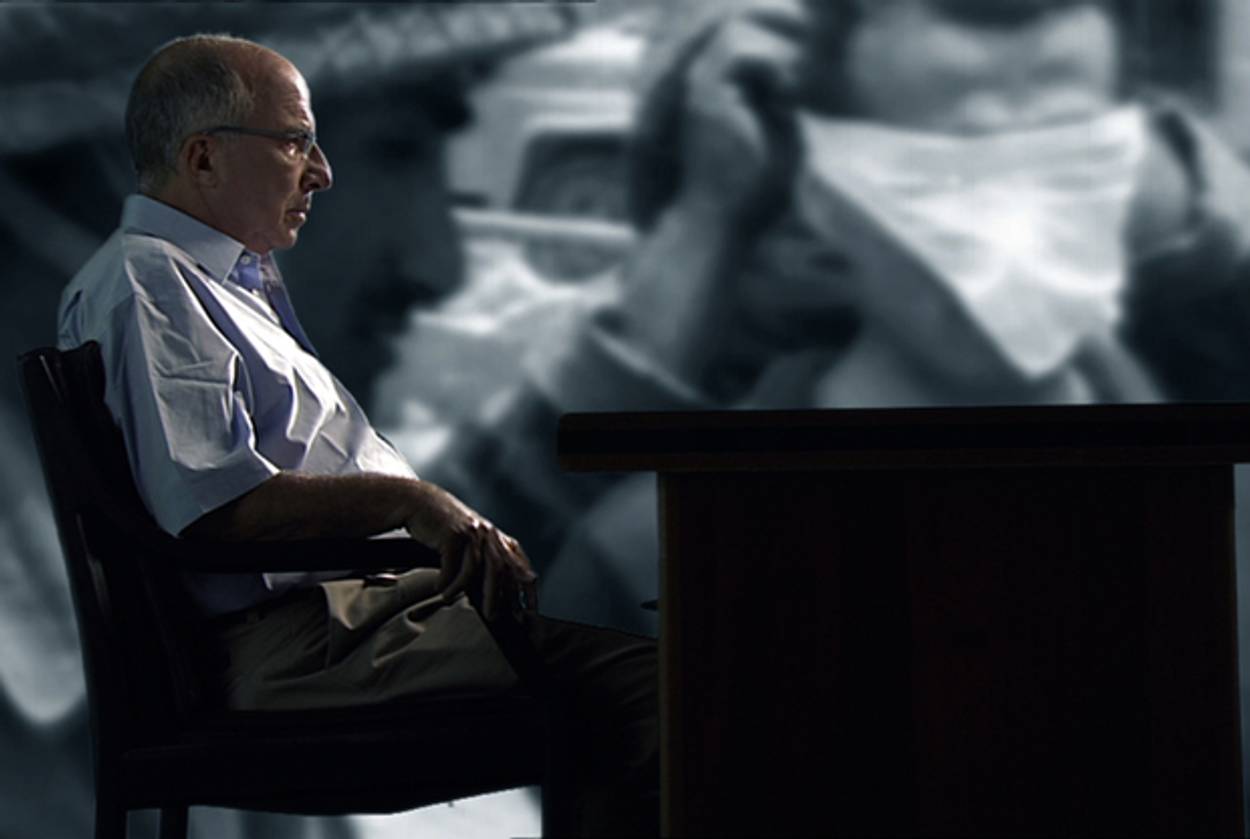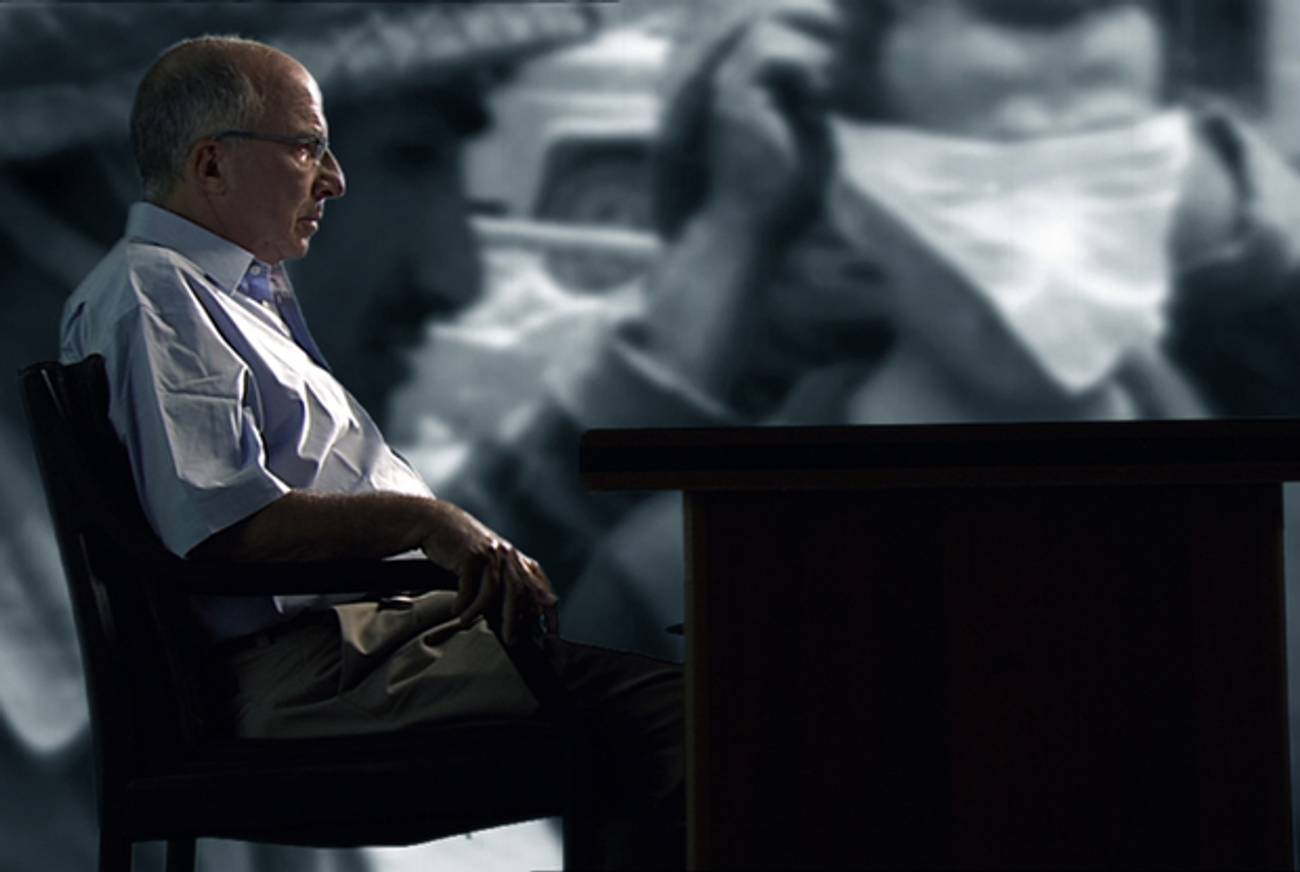The Occupation’s New Witnesses
A new movie and book shed light on the effect of Israel’s military presence in the West Bank on its soldiers




This December will mark the 25th anniversary of the Intifada, the Palestinian uprising that redefined the simmering and prolonged conflict between Israel and the civilian population it had begun to administer after assuming control of the West Bank and the Gaza Strip in 1967. Ours is a culture of commemoration, and an anniversary of this magnitude is likely to receive its share of pageantry and punditry. Amid all this, one hopes that two recent contributions by Israeli artists and activists, one a film and the other a book, do not get lost, as they provide a sober and somber account of how the Israel Defense Force—the core of Israeli society and still very much an unimpeachable institution for most Israelis—has changed to meet the needs of a growingly complex, and ultimately impossible, occupation.
The film, Ra’anan Alexandrowicz’s The Law in These Parts, which opened this month in New York, addresses the creation and operation of the military-run legal system that, before the Oslo Accords and to a certain extent even thereafter, adjudicated every facet of life for millions of Palestinians. Unlike the legal dramas we usually see in movies and on TV, Alexandrowicz’s documentary is bereft of embellishments: His movie is nothing more than a series of interviews with the men who presided over the system from its inception onward; often he cites specific cases or asks his subjects to reflect on the finer points of their verdicts. A capable storyteller—his previous film, James’ Journey to Jerusalem, was a winning comedy about a young Ethiopian boy on a pilgrimage to Israel’s capital—Alexandrowicz flirts with widening his lens and letting a few touching stories drift in. But wisely, he resists the urge, keeping his film zealously focused. He cares about nothing but the occupation’s legal system and, to his credit, searches out the system’s smartest possible defenders. But what he gleans is a knot of confusions, obfuscations, and injustices.
In one interview, for example, Amnon Strashnov, the deputy military advocate general during the first Intifada, casually admits to having rewritten the law to allow the army to place anyone under “administrative arrest” for an indefinite period of time and without seeing a judge. When Alexandrowicz asks Strashnov to elaborate on this measure, and to comment on a legal system in which one man could do away entirely with habeas corpus, Strashnov shrugs his shoulders. “That’s not interesting,” he says. It is, of course, and with each interview, Alexandrowicz makes a more convincing case for his thesis: Unlike the progressive and celebrated justice system applied in Israel proper, the military tribunals governing the occupation are too often a perversion of justice, blindly willing to sacrifice everything on the altar of national security.
Col. Oded Pesensson makes this point, however inadvertently, with uncommon candor. One of the army’s most prolific and well-respected judges, he admits, when grilled by Alexandrowicz, that Palestinian detainees are frequently not allowed to see the accusations made against them. The accusations, Pesensson explains, were brought forth by intelligence sources recruited by the Shin Bet, Israel’s internal security service, and to protect their sources, the Shin Bet’s agents would request that suspects be kept in the dark and given nothing more than a brief summary of their indictment. The only choice he had as a judge, the recently retired Pesensson sheepishly concedes, was whether or not to take the Shin Bet agent pursuing the case at his word and believe that the source was credible; almost always, Pesensson chose to believe.
Watching the movie, one is struck by a sense of systemic collapse, one that stems from the inability to reconcile the inherent tensions that arise from governing a civilian population and a swath of land that Israel will neither forgo nor formally annex. It’s a complication even the sharpest legal minds can’t resolve. As the film begins, one such expert, Dov Shefi, who headed the army’s International Law Branch between 1968 and 1973, is asked why the legal memorandum the army’s attorneys prepared before the 1967 war referred to any future territories seized in combat as “occupied territories,” while an updated memorandum, issued a few months after the army took hold of Gaza and the West Bank, changed the definition to the more ambiguous “held territories.” Shefi cannot answer.
And if men like him are unclear about the precise contours of the army’s engagement, ordinary soldiers are just rudderless, administering and carrying out policies whose sole function seems to be the strict discipline of the Palestinian population. That, at least, is the argument of Our Harsh Logic: Israeli Soldiers’ Testimonies From the Occupied Territories, 2000-2010, a collection compiled by Breaking the Silence, an a group of Israeli activists dedicated to collecting first-person accounts of military wrongdoing by the men and women who committed them during their service in the IDF. In detail, these young soldiers depict their service as dotted with senseless harassment of Palestinian civilians; the book’s early pages are thick with needless nocturnal searches, careless destruction of property, and other instances of applying might for its own sake.
Just as troubling, the system they describe is one that seems to disregard the safety of the soldiers themselves. Take, for example, a young paratrooper, stationed near Nablus, whose commander instituted a ranking system based on kills; the more enemy combatants a soldier had slain, the more privileges he could claim. “That’s what pushed us, I believe,” the soldier—who, like all interviewed for the book, is not identified by name—said. “What we’d do was go out night after night, drawing fire, go into alleys we knew were dangerous. There were arrests, there were all kinds of arrests. But the high point of the night was drawing fire, creating a situation where they fired at us. There were ‘bad’ Arabs, the ones who didn’t shoot at us.”
The book has many more such moments of madness. And they are rendered even more heartbreaking by the fact that the men making these uneasy confessions are all exceedingly young and, often, emotionally unable to properly reflect on or coherently express the horrors they’ve seen (and, frequently, committed). Like Alexandrowicz’s subjects, they, too, are allowed to speak uninterrupted, but unlike the lawyers, the soldiers are frequently ineloquent, stuttering their mea culpas as they struggle to understand the point of their service. They’re told it is security, but they doubt it. They’re told they’re looking for weapons; those are rarely found, and the proper means for their discovery—like special dogs trained to sniff out ammunition—are rarely deployed. The point of the occupation, the dozens of soldiers interviewed in the book ultimately conclude, is to prolong the occupation.
Their voices, and Alexandrowicz’s, deserve to be heard. Rather than affirm or revile them as talking points in a never-ending and increasingly shrill political debate, those anxious about Israel’s future would do well to listen to these serious, calm, and pained testimonies from its front lines and consider the deep problems they decry.
***
Like this article? Sign up for our Daily Digest to get Tablet Magazine’s new content in your inbox each morning.
Liel Leibovitz is a senior writer for Tablet Magazine and a host of the Unorthodox podcast.
Liel Leibovitz is editor-at-large for Tablet Magazine and a host of its weekly culture podcast Unorthodox and daily Talmud podcast Take One. He is the editor of Zionism: The Tablet Guide.